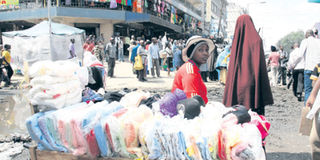US raises alarm over illegal cash transfers

PHOTO | FILE A trader at Nairobi’s Eastleigh area last year. A US report cites informal cash remittances in the area as one of the key avenues of money laundering in the country.
What you need to know:
- Report lists drug smuggling and elephant poaching as mainstays of money laundering
An informal cash remittance system based in Nairobi’s Eastleigh suburb has been cited by the US State Department report as one of the key avenues of money laundering in the country.
The report also lists drug smuggling, ivory poaching, trade in counterfeit goods and other financial crimes as the mainstays of money laundering, often linked to terrorist financing.
It defines Kenya as the largest financial centre in the East African region in which money laundering, which sometimes also takes the form of terrorist financing, is derived from domestic and foreign criminal activities.
Even though the US State Department Money Laundering Report, 2013, acknowledges CBK has attempted to stem the illegal trade, it has not been successful given the large black market in the country.
“Kenya is a transit point for international drug traffickers. Trade-based money laundering is a problem in Kenya, though the Kenya Revenue Authority has made recent strides in increasing its internal monitoring and collection procedures,” the report says.
It explains further: “The laundering of funds derived from corruption, smuggling, illicit trade in counterfeits, drugs, wildlife trafficking and other financial crimes is a substantial problem. Its proximity to Somalia makes Kenya an attractive and likely destination for the laundering of piracy-related proceeds.”
Underground networks
The State Department report reveals that although Kenya boasts of large formal banks, wire services and other avenues which can be used for money transfers, a host of networks of hawala and other remittances of money which have no records thrive underground. It argues that to a larger extent, the government has been unable to track down the informal networks.
With mobile money transfer systems becoming the most favoured tool, the report says the government is finding it an audacious challenge to track the illegal activities which are run by foreign nationals from neighbouring countries.
“Foreign nationals, in particular the large Somali refugee population, primarily use hawala to send and receive remittances internationally. Mobile money, using telecom networks for cash transfers, is increasingly important and makes tracking and investigating suspicious transactions more difficult,” it says.
Hawala, a popular system in the Middle East and parts of Asia, has been gaining popularity in Kenya particularly among residents of Eastleigh who mostly receive money from friends and relatives mainly in Somalia and further across the globe.




